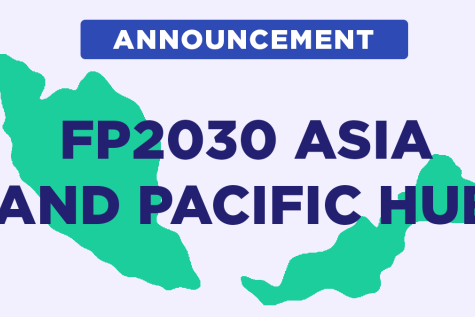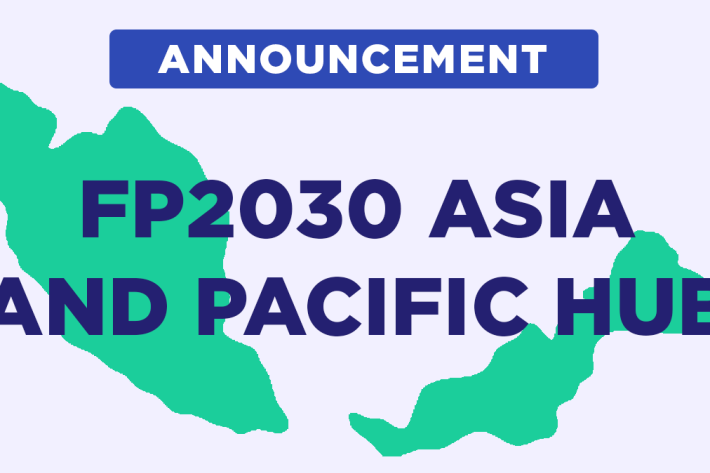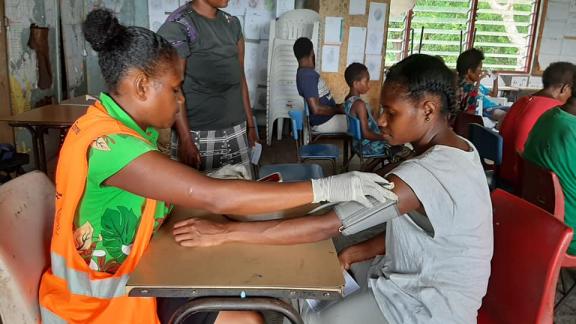
Spotlight
A selection of news from across the Federation

IPPF-ESEAOR TO HOST FP2030 ASIA-PACIFIC HUB
IPPF-ESEAOR will serve as the host of FP2030 Asia Pacific Regional Hub starting this year. This is the fourth FP2030 Regional Hub, preceded by the North America and Europe Hub in Washington DC, the East and Southern Africa Hub in Nairobi, Kenya, and the North, West and Central Africa Hub in Abuja, Nigeria. This is part of the ongoing transition of FP2030 - from a single secretariat office in the United States and now to a global support structure and presence.
Filter our news by:

| 18 October 2016
Providing family planning services to Cyclone Winston victims
IPPF implemented the Minimum Initial Service Package for Sexual and Reproductive Health in the wake of Cyclone Winston in Fiji. IPPF ESEAOR planned for the Fiji response and was able to deploy surge capacity on the first week. Within the first 20 days, six medical missions were already completed. What follows is the story of one of the women who received care in one of these missions: Savaira Buka who is a mother of six was one of the lucky survivors of the tragic Cyclone Winston. The 36-year-old mother originally from Nailaga, Western Fiji, who is married into the village, painfully gathers the memory of the night the storm claimed parts of their home. Savaira and her family moved back to her family home in Nailaga village two years ago to look after her mother who had lost one side of her leg to Diabetes. Cyclone Winston’s strong winds ravaged through her village taking with it walls and roofs of the homes in Nailaga, including Savaira’s. The home that she had once shared with her four other siblings and their families was now in ruins as with most of their belongings. Savaira heard about the IPPF-ESEAOR SPRINT medical mission from the village headman accepted the service provided by the IPPF team with open arms. Since the storm had struck their village "the IPPF reproductive health medical mission team was the first to ever visit our village and it stood out from the rest as it specifically targeted women of reproductive age and pregnant and lactating women," she shared. For Savaira, the health information sessions stood out as it boosted her confidence about sharing family planning issues with the reproductive health medical mission team from IPPF-ESEAOR SPRINT. After the health information session, she decided to access injectable contraceptives. After consultation with the medical doctor present in the mission, she was provided with the service. Savaira was not able to contain her smile as she continually thanked the team for the medical visit which was brought to them by the IPPF-ESEAOR SPRINT. Within a month of the cyclone’s landfall, IPPF ESEAOR Sub Regional Office in the Pacific and the Reproductive and Family Health Association of Fiji, through the Australian Aid-funded SPRINT Initiative was able to complete 37 (the plan was for 30) reproductive health medical missions. A total of 868 clients were served, 122 of which are pregnant and 272 are lactating. All 868 beneficiaries received information on family planning, danger signs of pregnancy, HIV/STI prevention, and sexual and gender-based violence during health information sessions that lasted between 20-30 minutes. Condoms and oral and injectable contraceptive were provided to 556 clients.
| 18 November 2016
IPPF SPRINT provides aid to Cyclone Winston victims in FIji
In the wake of the devastation caused by Cyclone Winston, IPPF-SPRINT is responding to ensure that essential reproductive and sexual health services are provided to affected communities in Fiji. The Australian Government has committed 100,000 Australian dollars to IPPF-SPRINT to reach out to an estimate of 84,250 women of reproductive age. IPPF East & South East Asia and Oceania Region, is responding to the humanitarian crisis through its member association, the Reproductive and Family Health Association of Fiji. “Cyclone Winston is the strongest recorded tropical storm to hit Fiji and it has severely affected communities across the country. It is essential that every effort is made to ensure that pregnant women, nursing and lactating mothers receive essential reproductive health services at this critical time” said Michael Sami, Head of IPPF Sub-Regional Office in the Pacific. “Our teams of nurses, medical staff and volunteers, including youth, will be deployed and become part of the national response. We shall provide clean and safe delivery kits, hygiene and dignity kits and reproductive health care services”. Among affected population, SPRINT-ESEAOR will continue to provide services such as pregnancy care, childbirth care, postnatal care, prevention and management of sexually transmitted infections and HIV, and prevention and management of gender-based violence. For more information and interviews with IPPF working in Suva please contact Michael Sami at +679 7773070
| 21 October 2016
IPPF’s humanitarian program; the SPRINT Initiative is providing crucial medical and sexual and reproductive (SRH) health services to #TyphoonKOPPU affected areas in Philippines
November 16, 2015: New Delhi|Kuala Lumpur: Typhoon Koppu (local name Lando) made landfall on the 18th of October inundating several parts of the Luzon area in the Philippines. The typhoon wreaked havoc, causing floods, power outages, road blockages, and has disrupted people’s lives. To address the crucial medical and sexual and reproductive health (SRH) vulnerabilities of the population, theInternational Planned Parenthood Federation (IPPF), through its humanitarian program, the SPRINT Initiative, is providing assistance to affected populations. Medical and SRH assistance is being provided through the Family Planning Organisation of Philippines (FPOP), a member association of IPPF East & South East Asia and Oceania Region (IPPF ESEAOR), with funding provided by the Australian Department of Foreign Affairs and Trade (DFAT). “Sexual and Reproductive Health (SRH) is a significant public health need in all communities, especially those facing emergencies. In emergency situations, there is often a lack of access to SRH services,” said Nora Murat, Regional Director, IPPF ESEAOR. “IPPF-SPRINT implements The Minimum Initial Service Package(MISP) for Reproductive Health, a standard for the provision of essential health service in flood affected areas of Echaque Municipality in Isabela Province of Region II – Cagayan Valley, Philippines. MISP is a coordinated set of priority activities for reducing SRH-related illnesses and deaths in times of emergency” she added. According to UNOCHA and the updates of the National Disaster Risk Reduction and Management Council, dated 3rdNovember, 2015, more than 3,126,130 people (733,152 families) have been affected. It is estimated that at the peak of the disaster, over 70,500 people (15,604families) were in 376 evacuation centres managed by local authorities. Of the affected population, more than 780,000 are women and girls of reproductive age (15-49 years old) and an estimated 31,000 are pregnant women who require special care. In crisis situations such as these, there is an increase in gender based violence (GBV) and access to health care becomes more difficult. Whilst the restoration of government services is in full swing, IPPF-SPRINT’s response is to prevent and manage the consequences of sexual violence, reduce the incidence of STI, including HIV, transmission and to prevent excess maternal and neonatal mortality and morbidity. “IPPF-SPRINT will work in close co-ordination with Reproductive Health-Maternal Child Health Working Group, United Nations Population Fund (UNFPA), Department of Health (DOH) and Philippine National Red Cross (PNRC) and FPOP. An amount of USD 35,000 has been mobilised by IPPF-SPRINT to reach out to more than4000 people’’ said Aditi Ghosh, Director, IPPF-SPRINT. “We shall also provide clean delivery kits, emergency obstetric care services and referral, and reproductive health medical teams to attend to the poorest of poor and the most vulnerable.” The efforts are complimented by in-county prepositioned stores, released by UNFPA and funded by the Australian Government, which include reproductive health kits and dignity kits for pregnant and lactating women, and awareness raising information-education-communication (IEC) activities for the affected population.

| 27 August 2015
Cyclone Pam hits The Happiest Place on Earth: Humanitarian Mission to Vanuatu Open Primary tabs configuration options Primary tabs
The Happy Planet Index has declared Vanuatu Archipelago ‘the happiest place on earth’ with its picturesque shoreline and friendly people. But unfortunately, Vanuatu - the Land Eternal- is a country with one of the highest disaster risks in the world. On Friday 13th of March 2015 cyclone PAM hit Vanuatu's southern provinces of Shefa and Tafea, causing widespread devastation. International Planned Parenthood Federation (IPPF), through its SPRINT initiative (supported by DFAT of Australian government), immediately responded providing life-saving reproductive health services with the help of its Member Association- Vanuatu Family Health Association (VFHA). The VFHA team, with Vanuatu Ministry of Health and United Nation Population Fund (UNFPA), established medical and reproductive health camps in the islands (North Tanna, Epi, North Efate) and remote villages. After the cyclone struck, the island people were left without any access to healthcare, leaving pregnant women especially vulnerable. Around the world, it is estimated that 60% of maternal deaths and 45% of newborn deaths take place in fragile contexts. So, many of these Vanuatu women and their babies are at high risk of maternal and neonatal morbidity and mortality. Furthermore, violence against women and girls is a growing social and economic issue in Vanuatu. The Vanuatu National Prevalence Study of 2010 reports that at least 60 % of the women experience physical or sexual violence and 30% experience childhood sexual abuse while under the age of 15 years. During a crisis situation, this violence is exacerbated. Aditi Ghosh, Acting Director, IPPF-SPRINT joined the VFHA team on their mission to the devastated Tanna Island. “The journey to Tanna was along a long, rocky mud track through deserted woodland, called the land of wild horses. Finally, after two hours, we reached a small village called Launatke, which had a few thatched houses scattered around the forest. We were welcomed warmly by locals. They sang a cyclone Pam song for us in local Launatke tribal language “the power of the storm was so strong that it destroyed everything…”. The VFHA team had turned a youth centre into a medical clinic. We listened to people telling us about the hardships they had faced during the cyclone. Julia, a young women in early 20’s– a mother of four, told us that she conceived her second baby immediately after she stopped breast feeding her first and the same pattern was repeated with the following two pregnancies. Her youngest child was five months old and she was worried she would get pregnant again …… but the cyclone gave her the opportunity get advice from the VFHA nurses. Now, she said, she can focus on taking care of her four young children without the fear of an unexpected pregnancy. We heard many similar stories throughout the afternoon. Next morning, we woke to thundering rain and a blanket of thick fog. We were headed for Labasilis village – a three hour trek through hills and forest. The medicine and supplies were packed in a waterproof bag and we set off - a team of seven including two doctors and two nurses. Keeping balance in slippery mud was a real challenge, everyone decided to walk barefoot for better grip. I was relieved to learn that Tanna doesn’t have poisonous insects or snakes. On our way, a team member told us that pregnant women have to be carried along this road, and then taken by truck the nearest clinic. How do these women survive through this journey? Not surprising that most women prefer to deliver at the village with the help of local (and untrained) birth attendants. No sterilized knives to cut the umbilical cord, instead they use sharpened bamboo. We heard an amazing story of resiliance .. like the one about the woman who while working on her field suddenly felt labor pains. She came back home, delivered on her own, covered the baby with a cloth at home and returned to the field to finish her work. After two hours we reached Loeala vama. I could see a few makeshift tarpaulin houses, a few damaged thatched houses. After providing some quick services in that village, we continued our walk along the slippery road towards our destination. The fog has become thicker now, covering the whole area. It was difficult to see even the team members ahead of me. Finally, after another hour of we reached our final destination – Labasilis village. There was an UNICEF tent, where we started to set up our outreach medical camp. Though it was an open tent, we partitioned a corner with a cloth for privacy. Soon I could see a stream of people coming towards us, over the hills. I was told that the surrounding villages had been informed about today’s camp and permission to visit given by the village chiefs. That day we saw more than 190 clients – treating a range of ailments from cold, fever, wounds, pneumonia to pregnancy tests, newborn, antenatal and postnatal check-ups, plus family planning counseling and services. We saw many young parents- many with four or more children. Someone joked that here boys will have babies before they have beards. We could see for ourselves, how true that was. I also noticed a young shy pregnant woman, with small baby on her lap, who quietly asked the nurse if she could talk to her in private. Her name was Natalie. She had been prescribed Jadelle (Long Acting Reversible Contraception), when she visited the clinic two months ago. But, when she returned to her village, people scared her by saying the medicine was for wild horses and somehow they removed the Jadelle implant from her arm. And now she is again pregnant, unwillingly. Heading back to the airport in the pouring rain I thought about wild horses, old wives tales and how Natalie will cope with her new pregnancy.

| 06 December 2016
Stepping up information and services during emergencies
IPPF Member Associations through the SPRINT Initiative have strengthened partnerships with various agencies to increase SRH services to disaster affected populations. UNFPA trained nurses of the Vanuatu Family Health Association (VFHA) on how to insert Jadelle® implants; provided a vehicle for o u t r e a c h p r o g r a m s , 100 dignity kits for distribution and two tents for outreach camps in the aftermath of Typhoon Pam. VFHA also worked with the Association for Aid and Relief (AAR) Japan in the provision of a 6,000 liter water tank for safe drinking water for North Tanna VFHA Clinic. The Myanmar Maternal and Child Welfare Association (MMCWA) is collaborating well with the Kachin State Health Department and UNFPA in the provision of SRH services through the basic health service medical missions to 40 IDP camps located in Myit Kyi Na and Waing Maw districts of Kachin State. SPRINT supported the direct procurement of UNFPA RH Kits and SPRINT Community Medical Mission Kits. These kits complemented the medical commodities that were being offered to the internally displaced population (IDPs) in the camps. In response to the Mount Sinabung volcanic eruption, the Indonesian Planned Parenthood Association (IPPA) in coordination with local authorities, distributed dignity and hygiene kits to the affected population. IPPA North Sumatera chapter is exerting extra efforts to be more involved in responding to the needs of the community, especially regarding access to SRH information and services. There is no guarantee when the eruption will end. While the government is focused on food distribution and shelter, the main problem that the villagers face is loss of land. Being farmers, this renders them jobless. Children and youth have also been identified as being at risk as they have been in the camps for almost 2 years. IPPA has carried out site mapping and identified NGOs and volunteer groups who can be potential partners in delivering more services.

| 11 October 2016
New cooperation with Solomon Island Government to grant IPPF role as executing agency
The Government of Solomon Islands agreed to cooperate with International Planned Parenthood Federation (IPPF) this week to advance the work on sexual and reproductive health and rights (SRHR) across its provinces. The Prime Minister announced its commitment to improve SRHR for all by 2020 and a partnership role with IPPF. In the first of a series of meetings between Ministers and high level government officials across the Pacific and Australia this month, IPPF Director General and Acting Solomon Islands Prime Minister Hon. Manasseh Maelanga brokered a partnership which will see the Federation designated as an executing agency on behalf of the Government of the Solomon Islands to advance sexual and reproductive health and rights of all people across the provinces. IPPF Director General, Tewodros Melesse said: “This is a great step for the Government and IPPF. Our Member Association, Solomon Islands Planned Parenthood Association, has been working diligently to improve the lives of people across the Solomon Islands through a range of much needed services. Through this extensive partnership arrangement we can take that work to the next level to improve access, increase the range and quality of Government services and integrate our expertise to better the lives of people across the Solomon Islands. This focus will ensure services reach those who are poor, marginalized and socially excluded and wherever there is a need”. IPPF’s Member Association - Solomon Islands Planned Parenthood Association will work closely with the Government to convene meetings across provinces with national ministries, non-governmental and faith based groups and medical associations to advise and prepare a budgeted action plan to help realize sexual and reproductive health and rights for all by 2020. The cooperation will see IPPF play a large role in supporting and representing the interests of the Solomon Islands with key international multilateral and bilateral donors, including the African-Caribbean-Pacific Group of States to support the implementation of these plans, to strengthen sexual and reproductive health and rights.
Pagination
- First page
- Previous page
- …
- 6
- 7
- 8









